

Funding. PGCE. Employment-Based Routes into Teaching. Teaching in Independent Schools. Teaching in Scotland. Teaching in Wales. Teaching in Northern Ireland. Teaching in the Republic of Ireland. Subject Specific Information. Getting your first teaching post. Masters in Teaching and Learning. New plans to attract and train maths and physics teachers. The Prime Minister has set out plans to transform maths and physics teaching in our schools.

It aims to: train thousands of new teachers fast track professionals into the classroom attract the country’s top graduates and university fellows Today’s announcements will see £67 million invested over 5 years to open up routes into maths and physics teaching. There will be financial incentives and fast track courses to get former teachers, high quality career changers and top graduates into the classroom. Today’s announcement includes plans to boost the skills of 15,000 existing non-specialist teachers and attract up to 2,500 additional specialist maths and physics teachers over the next 5 years. Bringing former teachers back into the classroom. How do you become a teacher. To work as a teacher of children from age five to sixteen in state maintained schools (excluding academies and free schools) in England and Wales you need to have professional qualified teacher status (QTS).
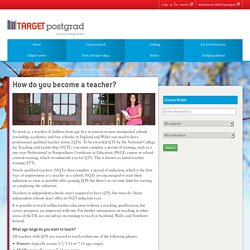
To be awarded QTS by the National College for Teaching and Leadership (NCTL) you must complete a period of training, such as a one-year Professional or Postgraduate Certificate in Education (PGCE) course or school-centred training, which recommends you for QTS. This is known as initial teacher training (ITT). Newly qualified teachers (NQTs) then complete a period of induction, which is the first year of employment as a teacher in a school.
NQTs are encouraged to start their induction as soon as possible after gaining QTS but there's no set time limit for starting or completing the induction. My review of the Autumn Fair – Teacher training options. Fiaza Boota is a 2nd year History student and is one of this year’s History Interns, focusing on the Teaching sector.
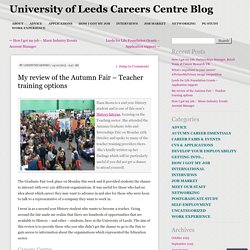
She attended the Autumn Graduate Jobs and Internships Fair on Monday 12th October and spoke to many of the teacher training providers there. She’s kindly written up her findings which will be particularly useful if you did not get a chance to attend yourself. The Graduate Fair took place on Monday this week and it provided students the chance to interact with over 120 different organisations. A1 Teaching FAQs 2015 update. A1 Routes into Teaching. DfE Get Into Teaching. GTI Specialist Publishers. A1 RoutesintoTeaching. Get into teaching. Videos UCAS. Postgraduate Routes Into Teaching - PGCE And Much More. Apply And Track Your Progress. Apply through UCAS Teacher Training for postgraduate teacher training programmes in England and Wales, and track the progress of your application.
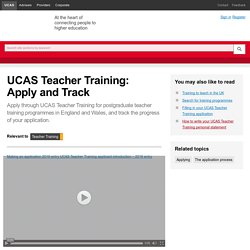
Making an application to UCAS Teacher Training This in-depth video takes you through the entire process of making an application once you've decided which training programme is right for you. View more videos. Overseas applicants. As a talented, trained and qualified overseas maths, physics, French, German or Spanish teacher, you are in demand.
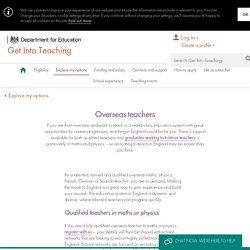
Making the move to England is a great way to gain experience and build your resumé. The education system in England is dynamic and diverse, where talented teachers can progress quickly. Qualified teachers in maths or physics If you are a fully qualified overseas teacher in maths or physics, register with us – your details will then be shared with school networks that are looking to recruit highly skilled teachers in England. School networks are focused on recruiting and supporting overseas teachers within their region of England. Qualified teachers in French, German or Spanish.
Choosing a training provider. Get the early research right You can initially only apply to your three preferred training providers via UCAS Teacher Training during the Apply 1 phase.
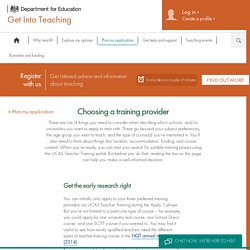
But you’re not limited to a particular type of course – for example, you could apply for one university-led course, one School Direct course, and one SCITT course if you wanted to. You may find it useful to see how newly qualified teachers rated the different types of teacher training course in the NQT annual survey (2014). If you’re successful at the application and interview stages, you’ll be committing to the course for a year. So it’s really important to make sure you thoroughly research the options and understand how your degree class, course type and subject preference can influence your options for funding.
Individual training providers can advise on what support may be available based on your circumstances, including SKE options – so it’s worth contacting them about this before applying. A guide to researching TT courses. Passing the skills tests. Your first attempt at each test is free of charge.
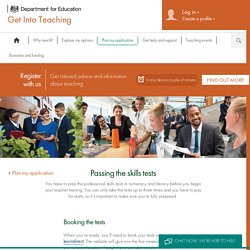
If you don’t pass within three attempts, you will need to wait 24 months before you can book any further tests – this would mean starting the teacher training application process again, so make sure you have plenty of time to revise in advance. Don’t worry – there’s lots of support available to help you get ready. This includes the practice literacy materials and practice numeracy materials. Professional skills tests. Leeds University Library /All Locations. A1 email booking a skills test april 15. What kind of school do you want to teach in? The way a school is funded and managed has a big impact on its working environment.

Before you apply for a teaching job you need to think about what you want to get out of it and what kind of school will best suit your needs. There is no such thing as a standard school. Location, size and the gender mix are important factors; a small rural primary school will face different challenges to a large city academy in a deprived area or a single-sex grammar school. The way a school is funded and managed will have a big impact on the working lives of its teachers, so it’s worth giving some thought to the type of environment that will suit you best. What different types of school can you teach in? Education in the UK falls into two sectors: state maintained and independent.
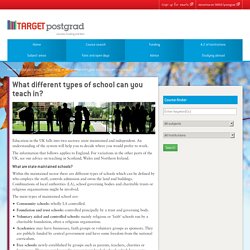
An understanding of the system will help you to decide where you would prefer to work. The information that follows applies to England. For variations in the other parts of the UK, see our advice on teaching in Scotland, Wales and Northern Ireland. What are state maintained schools? Within the maintained sector there are different types of schools which can be defined by who employs the staff, controls admission and owns the land and buildings.
The main types of maintained school are: Community schools: wholly LA controlled.Foundation and trust schools: controlled principally by a trust and governing body.Voluntary aided and controlled schools: mainly religious or 'faith' schools run by a charitable foundation, often a religious organisation.Academies: may have businesses, faith groups or voluntary groups as sponsors. What is available in the independent sector? DfE Get Into Teaching. Subject knowledge enhancement (SKE) courses. The teacher training provider(s) you apply to may ask you to take an SKE course if they feel you have the right qualities to become a teacher, but they think you need to complete additional subject training first.

If that’s the case, they’ll offer you a place conditional on doing an SKE course. This could be for several reasons, including: your degree wasn’t in your chosen subject, but it was closely relatedyou studied the subject at A level, but not at universityyou have relevant professional experience, and an SKE course will show you how to apply that to the curriculum and your teaching. Are you ready to apply? Applying for postgraduate initial teacher training. Most initial teacher training programmes use the UCAS Teacher Training website for applications.
For other programmes, you may need to apply directly to the provider. As part of the application process, you'll also need to arrange to sit the professional skills tests. What is the application process? Teacher training: Applying for teacher training. Popular with graduates, teacher training can be very competitive. A1 Teacher Training tips. Write a great application for teacher training. Most postgraduate teacher training applications in England and Wales are made through UCAS Teacher Training. The application form is the same for: the university or college-led Postgraduate or Professional Certificate in Education (PGCE)school-centred initial teacher training (SCITT)School Direct, salaried and unsalariedsome programmes with further education (FE) colleges for FE/post-compulsory teacher training The application process (Apply 1) opens on 6 October for you to search for training courses that start the following autumn. Your written application.
Writing your personal statement When you submit your application via the UCAS Teacher Training portal, you’ll need to write a personal statement. You need to make a big impression, but the space on the form is limited to 4,000 characters, split across a maximum of 47 lines, including spaces and line breaks – so use it wisely. A good statement should highlight your personal strong points and how you can bring these to teaching. There’s no ‘one size fits all’ approach, so you should avoid empty clichés or generic statements that don’t say something about you as an individual. We have a handy list of things to keep in mind, but as a general guide, it’s a good idea to cover key points such as: How to write your personal statement for teacher training.
This is a crucial part of the application and your chance to stand out from the crowd. You have up to 47 lines (4,000 characters including spaces) in which to persuade your chosen initial teacher training (ITT) providers to offer you an interview. The statement must be concise, enthusiastic and sell your potential to be a successful teacher. What you should include in the personal statement Providers will be looking for evidence that you understand the realities, rewards and challenges of teaching. Submitting your application.
Arranging your references Supplying references is a compulsory part of the application process, and you will not be able to progress without them. What to expect from the teacher training interview and selection day. Preparing for your interview. Interview questions for teacher training. Preparing for Teacher Training Interviews. Return to teaching. Practical information and resources for returning teachers. Get up-to-date with changes in schools. Montessori teacher Job Information. Page Content. Music teacher job information. A1 TeachingTaskGroupBulletin. Home - The Association for Science Education. ATL. Association of Teachers and Lecturers: the education union. Best Practice Network. Schools, colleges and children's services : School and college careers and employment.
Schools and colleges: Early learning and childcare. Careers with music - general information. Friday 15 July 2011 A career with music is challenging and worthwhile, and offers a high level of job satisfaction for anyone with a strong interest in music. Music offers a wide variety of opportunities. There are performers and composers, teachers in schools and at home, administrators, publishers, record companies, instrument manufacturers, librarians, broadcasters and journalists. A career with music? The skills and experience required for each activity are quite specific; but many people occupy more than one niche during their careers. When you embark on your musical career, ISM membership is the best way to equip yourself with legal and professional backing, technical advice and essential insurance schemes, as well as opportunities for professional development. To find out more, browse through the subjects listed below. International Society for Music Education (ISME.org) Music Education Council - Home.
NASUWT home page content. The national curriculum. The ‘basic’ school curriculum includes the ‘national curriculum’, as well as religious education and sex education. The national curriculum is a set of subjects and standards used by primary and secondary schools so children learn the same things. It covers what subjects are taught and the standards children should reach in each subject. Other types of school like academies and private schools don’t have to follow the national curriculum.
National Union of Teachers - NUT. Postgradireland.com – course information and advice for students in Ireland and Northern Ireland. Schools Web Directory UK - Search Schools by LEA. The Council for Subject Associations - A voice for subjects. Teacher Training and Education in Wales - Teacher Training Wales, Teacher Training Cymru, Education Wales, Education Cymru. Teacher Network - Education resources and teaching vacancies. Welcome. Teaching Music. Teaching Times - Imaginative Minds. TeachPE.com - physical education and coaching information site.
Culham St Gabriel's. Royal Society of Biology.